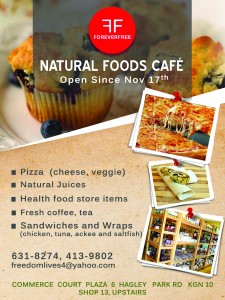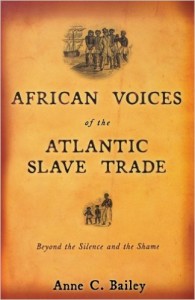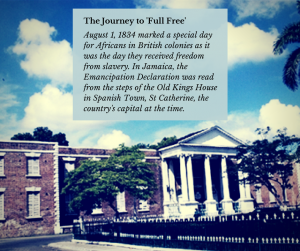
Freedom is a Process, Says Farmer and Cafe Owner Anne Bailey
December 23rd, 2015
“I know it’s hard for Jamaicans to change their eating habits,” says Anne Bailey, smoothing down her apron. “It takes time.”
Dr. Bailey has just opened a café in Kingston’s busy Half Way Tree area. It’s a café with a powerful message, as its name, Forever Free suggests. Tucked away upstairs in a small plaza, it offers a simple menu of cheese and vegetable pizza, natural juices and freshly made sandwiches and wraps. It also sells a range of health food items, and some attractive T shirts with the Forever Free logo. Dr. Bailey is just starting to build the offerings, as well as her customer base. She would like to see Jamaicans gradually change their ways of eating – still the traditional food, but with less fat, less salt and sugar. There are always healthier options.
What is unique about the Forever Free café? We noted the motto “Health and Heritage,” painted high on a wall in deep scarlet lettering. That is a hint. The heritage that Dr. Bailey is creating is a 22-acre farm in Oracabessa, St. Mary (her roots are actually in Long Bay, Portland, where members of a family also farmed). There are weekly deliveries from St. Mary to the café, including coconut water produced there – “farm to table,” as it were. Now, the freedom and heritage philosophy is woven into the farm too; Dr. Bailey’s plan is to turn it into an “interactive Emancipation Park,” including a monument honoring the many thousands who suffered and died during the Transatlantic Slave Trade. The property has great eco-tourism potential, Ms. Bailey believes, that would provide employment and income to the local community. As Executive Director of the non-governmental organization Green Team International (the Bauta Family is one of their supporters) she has already established a school garden project at Jacks River Primary School (now in its second year) and has just started one at Albion Mountain Primary School in St. Mary, with additional support from good friends in Highgate. “The principals and teachers at both schools work incredibly hard for the students – with very limited resources,” says Dr. Bailey.
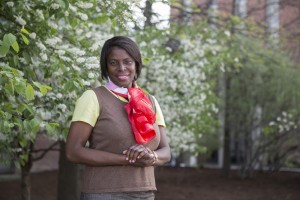
Anne C Bailey, Associate Professor of Africana Studies and History at the Harpur College of Arts and Sciences, SUNY Binghamton, photographed along the DeFleur Walkway, May 12, 2014. Dr. Bailey studied English and French at Harvard and obtained her Ph.D. in African History and African Diaspora Studies at the University of Pennsylvania.
I first met Dr. Bailey about ten years ago at a book signing in Jamaica. She also gave a talk based on her book African Voices of the Atlantic Slave Trade: Beyond the Silence and the Shame (published by Beacon Press in 2005 and Ian Randle Publishers in 2007). I recall that the late Professor Rex Nettleford brought greetings at that event. For the past academic year she has been in Jamaica – on her second stint as a U.S. Fulbright Scholar – conducting research for her upcoming book on the Jamaican diaspora. Her first Fulbright was in Africa. Yet alongside her academic life, and even after migrating to New York, Dr. Bailey maintained her interest in rural development, in particular in family farms.
Meanwhile, as a writer, historian, and a tenured professor of History and Africana Studies at SUNY Binghamton (State University of New York), she has always sought to bring history to life, as in her book, which includes African accounts from those personally involved in the slave trade – making connections between past and present. Her Peace Farm would equally become an imaginative embodiment of history, for Jamaicans young and old (as well as visitors) to experience: a place to learn and reflect on the environment that is our heritage – our past wrapped up in our present. The farm and café would become a fusion of food security and history, indeed of “Health and Heritage,” the inscription on the wall.
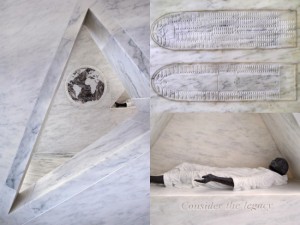
The Ark of Return, the Permanent Memorial at the United Nations to Honor the Victims of Slavery and the Transatlantic Slave Trade, was unveiled on 25 March 2015, which marks the International Day of Remembrance of the Victims of Slavery and the Transatlantic Slave Trade.
Dr. Bailey has several projects on hand. She is currently working on two books: The Weeping Time: History and Memory of the Largest Slave Auction in US History and Back to the Future: Jamaican Identity and the Jamaican Diaspora in a Globalized World, which is co-edited by Dr. Hilary Robertson Hickling of the University of the West Indies. Dr. Bailey reminded me that on March 25 this year, the Permanent Memorial to Honor the Victims of Slavery and the Transatlantic Slave Trade was unveiled at the United Nations – an event at which Jamaican Prime Minister Portia Simpson Miller spoke, declaring, “My soul remains tortured by the historical memory of the travails of the Middle Passage…”
The texts of two historic documents are displayed on the café walls, connecting the American and Jamaican journeys to freedom. One is President Abraham Lincoln’s Emancipation Proclamation of January 1, 1863, in which the words “[thenceforward and] Forever Free” are highlighted. On March 18, 2013, Dr. Bailey spoke at the United Nations on the occasion of the commemoration of the 150th anniversary of President Lincoln’s Proclamation. The second text is Jamaica’s own “Full Free” Emancipation Declaration of August 1, 1834 (I really love that phrase). The struggle for freedom was by no means over for those peoples of the African diaspora after the documents were signed; but they were the start, the first steps. Freedom is indeed a process; it doesn’t happen overnight, as the saying goes. It is continuous.
Graphic: diGJamaica.com
“Everyone is seeking freedom in different ways,” observed Dr. Bailey as we read these powerful, stirring words. We thought about the Muslim Rohingyas, “non-citizens” of Burma in rickety boats, and the Syrian families struggling across Europe, away from their country battered by war. There are many others seeking freedom from oppression, right across the world. It goes on, and on.
“Peace is a process,” said Dr. Bailey. “Freedom is a process.”
Contact Forever Free Natural Foods Café at (876) 631-8274 or 413-9802 or by email at freedomlives4@yahoo.com. The address is Shop 13/Upstairs, Commerce Court Plaza, 6 Hagley Park Road, Kingston 10.
Tags: Abraham Lincoln, Africana Studies, agriculture, Albion Mountain, Anne Bailey, eco-tourism, Emancipation, Emancipation Proclamation, farmers, freedom, Fulbright Scholar, full free, human rights, Ian Randle Publishers, Jacks River, Kingston, New York, NGO, nutrition, Permanent Memorial to Honor the Victims of Slavery, Portia Simpson Miller, Prime Minister, Professor Rex Nettleford, refugees, Rohingya, rural development, slavery, St. Mary, State University of New York Binghamton, SUNY, sustainable development, Syria, tourism, Transatlantic Slave Trade, United Nations, United States, University of the West Indies
The Gleaner reserves the right not to publish comments that may be deemed libelous, derogatory or indecent.
To respond to The Gleaner please use the feedback form.
- We Are the Zoomers
- Living Online with Humans and Birds: NAOC 2020
- Human Trafficking and the Problem of Public Education
- Down Memory Lane
- Are We Ready to Recover from COVID-19?
- Road Safety Matters: Is Your Vehicle Safe?
- Sexual Harassment, Me Too, and the Minister’s Disturbing Giggle
- The Vulnerable Senior Citizens, Private Care Homes and COVID-19
- A Muddle Over Masks
- Here is Something Life-Saving You Can Do: Give Blood!

